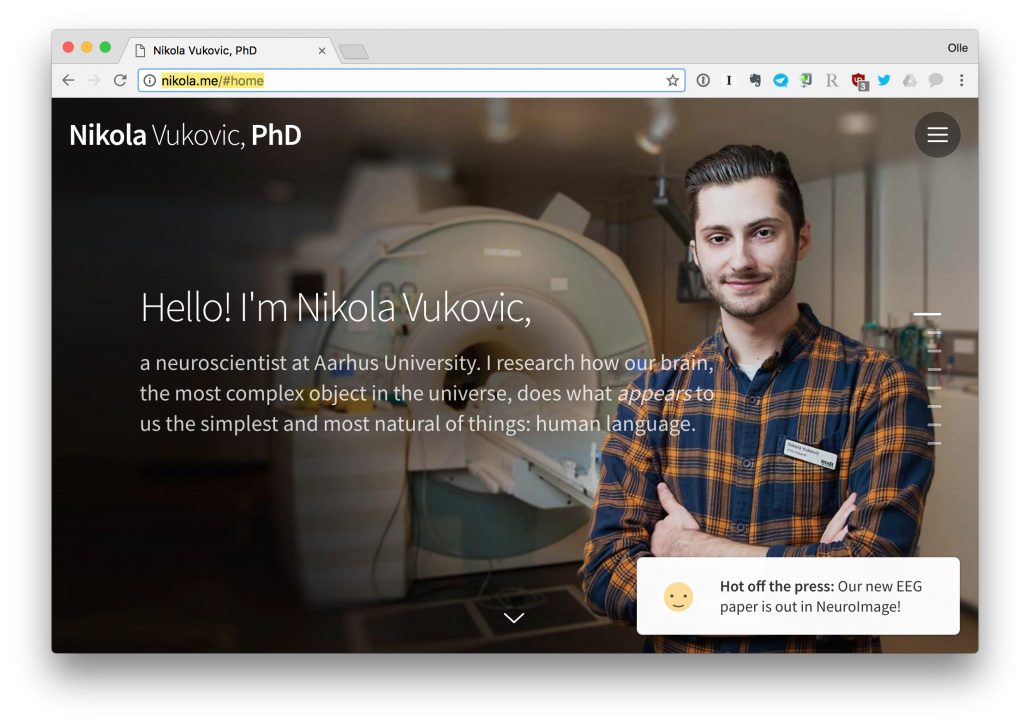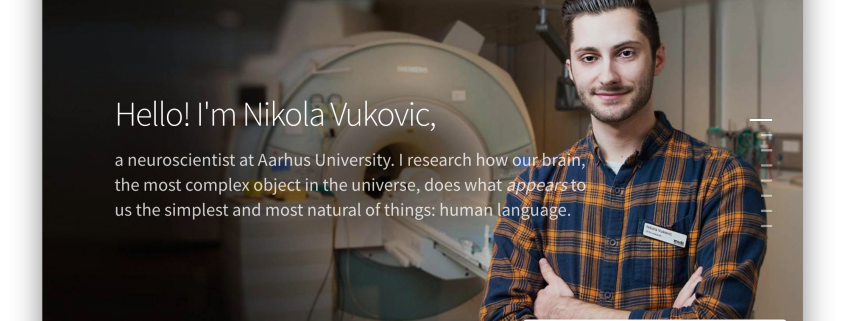Nikola Vukovic, Aarhus Uni: “My website helps me keep a consistent professional profile online”
”Having a personal website allows you to create a unified platform to integrate all your various identities,” says Nikola Vukovic, postdoc at Aarhus University in Denmark. This month, Crastina is reaching out to scientists who uses a personal website as a communication platform.
 The Crastina theme of November–December 2017 is “the scientist’s personal website”.
The Crastina theme of November–December 2017 is “the scientist’s personal website”.
 Nikola Vukovic (http://nikola.me/) is a postdoc at the Centre of Functionally Integrative Neuroscience (CFIN) at Aarhus University. He obtained a PhD in Cognitive Neuroscience from Cambridge University in 2015, and has since studied how language is processed in the brain
Nikola Vukovic (http://nikola.me/) is a postdoc at the Centre of Functionally Integrative Neuroscience (CFIN) at Aarhus University. He obtained a PhD in Cognitive Neuroscience from Cambridge University in 2015, and has since studied how language is processed in the brain
“Specifically, I am interested in word meaning and the mechanisms through which we comprehend,” Nikola says. “Unlike any other animal, humans are able to take scribbles on a piece of paper, or rhythmic fluctuations in air pressure (i.e. speech), and mentally construct elaborate sensorimotor simulations of word meaning. I use tools such as MEG, fMRI, and non-invasive brain stimulation, to investigate this topic.”
So, why did you chose to create your own website?
As for why I created a personal website, there are several reasons.
One of them is that, as early career researchers, we often have to move between institutions and even countries. This means that personal pages hosted by your Department are temporary, and will disappear when you change affiliations. Commonly, these pages are also inflexible, badly laid-out, and hide behind clunky and impossible-to-remember URLs.
In contrast, having a personal website gives you a lot of flexibility with the design and content. For example, one can include personal information and interests, which wouldn’t be as appropriate on your official university profile.
And finally, having a personal website allows you to create a unified platform to integrate all your various identities (researcher, teacher, administrator… human being?) and outputs, such as publications, slides, data, outreach projects, social media, and contacts.
What do you gain from having a website during a normal working week?
That would depend on the week. Most of the time, it doesn’t require any effort in maintaining, and I don’t give it much thought. However, I like knowing that my friends and colleagues always have a single place to keep up to date with my work.
I believe my website has also helped me keep a consistent professional profile online, which on several occasions led to contacts from journalists, other scientists, and even undergrads reaching out for advice. When a paper of mine gets published, I can see the website driving traffic to the in-print publication. Similarly, if you are looking for a new job, I’m sure having a well-thought-out personal website will be a benefit (employers routinely do a Google search of candidates).
What was easier and what was harder than you had expected?
Creating a personal academic website is surprisingly easy! There are many platforms and services which allow you to do so in minutes, and without coding skills. For example, you can use WordPress with a custom domain or an out-of-the-box solution like Squarespace.
Do you think that all scientists should follow your example?
I think all researchers should use digital technologies for their benefit. Depending on the person and their goals, this may mean creating a personal website, but it could also be sufficient to maintain a good university-hosted page, or just a LinkedIn page.
Whatever your inclination, however, I believe scientists have a responsibility to communicate their research more widely than they traditionally have. Given a climate of eroding public trust (and funding!) in science, leading to federal policies which threaten the survival of entire disciplines, scientists need to rid themselves of ivory-tower mentality and explain why what they’re doing is valuable. A good first step is to have a web page targeted not only at experts, describing your work in terms anyone can understand.
Give three pieces of advice to the early career scientist who wants to create a personal website!
- Buy an easy to remember and intuitive URL – you can get one for as little as 10$ a year.
- Hosting can be expensive, but since most academic pages are static, you can link the aforementioned URL to free hosting on websites such as Github Pages, Google Pages, or Firebase Hosting.
- Keep your website consistent and professional – make sure to include your CV and a short bio, a research description and publications, and contact details.
Further reading: Why you A-B-S-O-L-U-T-E-L-Y need a personal website as a scientist
- Claire Price of Crastina receives outreach award from Royal Society of Biology - October 25, 2020
- Agile Science student project at Brussels Engineering School ECAM: “We can’t wait to try it again!” - August 28, 2020
- Create an infographic in the Lifeology SciArt Infographic Challenge - June 16, 2020
- Adam Ruben – The scientist that teaches undergraduate students comedy - March 27, 2020
- Sam Gregson, Bad Boy of Science: “Comedy helps to bridge the gap” - March 10, 2020
- The Coolest Science Merchandise of 2019 - December 16, 2019
- Science Media Centre (UK) offers guide on dealing with online harassment in academia - November 26, 2019
- Agile project management taught to students and researchers at Karolinska Institutet - September 20, 2019
- Stefan Jansson: Improve your credibility! (Crastina Column, September 2019) - September 6, 2019
- The People’s Poet: Silke Kramprich, tech communicator - August 31, 2019





Leave a Reply
Want to join the discussion?Feel free to contribute!